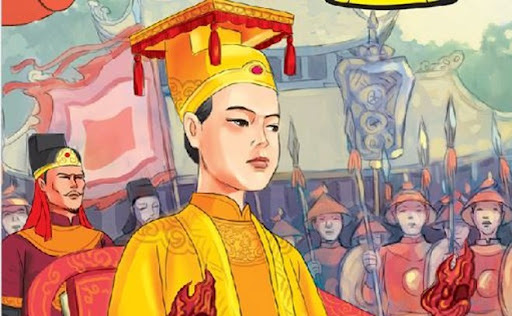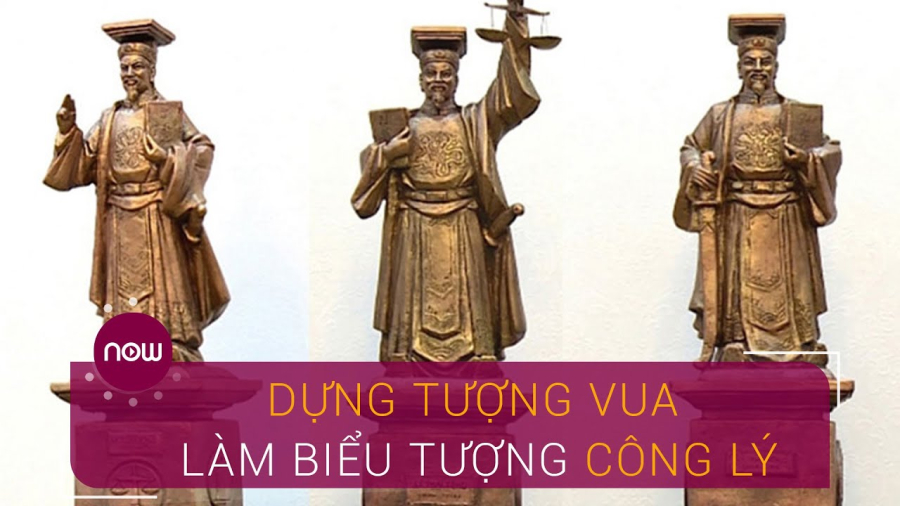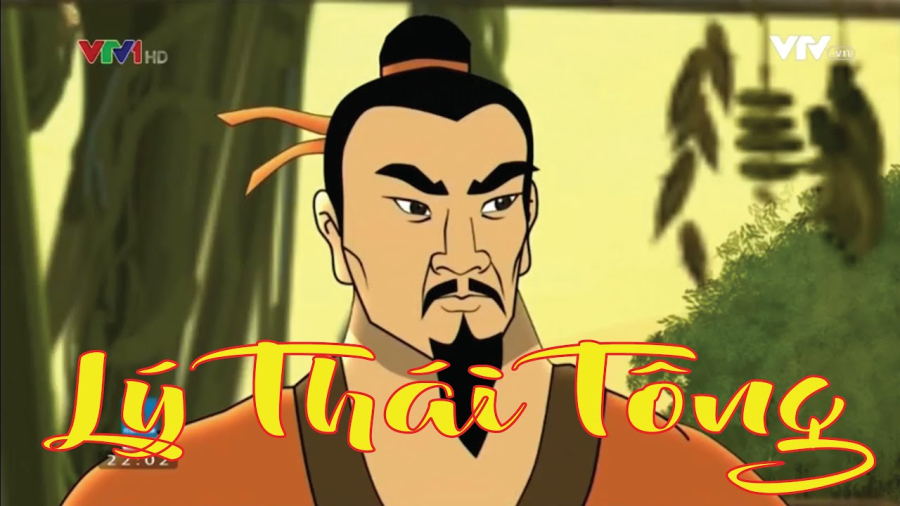Throughout the feudal dynasties in Vietnam, there have been many kings, but do you know which king is the most famous, just, and beloved by the people?
King Ly Thai Tong, whose real name is Ly Phat Ma or Ly Duc Chinh, was born on June 26, Canh Ty Year (1000). He is the eldest son of King Ly Thai To and Queen Hoang.
According to the book “Famous Kings of Vietnam,” at the age of 13, he was appointed as the Eastern Palace Crown Prince by his father, then granted the title “Khai Thien Vuong” and established a residence outside the imperial palace to get to know the officials and the people. During his time as Crown Prince, he was sent numerous times as a General to suppress uprisings and achieved great successes.

In 1028, King Ly Thai To passed away. Crown Prince Ly Phat Ma was the rightful heir. However, before the funeral for the king could be completed, the princes Vo Duc Vuong, Duc Thanh Vuong, and Dong Chinh Vuong led an army to besiege the capital, demanding the throne from the Crown Prince. It was called the “three rebellious princes.” General Le Phung Hieu led the army to suppress the rebellion and killed Vo Duc Vuong, the other two princes managed to escape.
After suppressing the rebellion, Ly Phat Ma ascended the throne with the title “Ly Thai Tong.” Duc Thanh Tong and Dong Chinh Vuong returned to accept their punishment and were pardoned by the king.
According to the “Dai Viet Su Ky Toan Thu,” from the moment of his birth, King Ly Thai Tong had seven moles growing on the back of his neck, forming a constellation called the Big Dipper. The Big Dipper is the brightest constellation in the Northern Hemisphere, symbolizing the king according to ancient numerology. When Ly Cong Uan ascended the throne, he immediately appointed Ly Phat Ma as the Crown Prince.

The “Dai Viet Su Ky Toan Thu” also recorded two events confirming that Ly Phat Ma’s ascension to the throne was “the will of heaven.” The first event was in 1020 when Ly Phat Ma led the army to attack Chiem Thanh and encountered a golden dragon on a throne in the middle of a boat. That time, Ly Phat Ma defeated the Chiem army and captured their general.
The second event was in 1027 when Ly Phat Ma presented a royal robe to the monk Tran Tue Long at Quan Nam De. That night, a bright light illuminated the entire temple. Tue Long was surprised and saw a golden dragon appearing on Ly Phat Ma’s robe. The “Dai Viet Su Ky Toan Thu” stated: “These events were all heaven’s will, everything here is in accordance.”
King Ly Thai Tong paid particular attention to issuing laws to maintain order and discipline. In 1042, he issued the “Hinh Thu” code.
The book “Dai Viet Su Ky Toan Thu” recorded: “In the past, there were many troubles in lawsuits within the country because the officials enforced the law too strictly, resulting in injustice. The king took pity and appointed scholars to amend and define the laws, making them more suitable for that time, classifying and elaborating the provisions, creating the ‘Hinh Luat’ book for a dynasty, making it easy for people to understand. After completing the book, the king issued a decree, and the people found it convenient. From then on, judicial procedures were clear and straightforward, so a new era was named ‘Minh Dao’ and coins were minted ‘Minh Dao.’
The “Dai Viet Thong Su” book states that the “Hinh Thu” code consisted of three volumes, which is now lost. This was the first specific legal system to be established and applied uniformly throughout the country, capable of regulating social relations.

According to the chronicles of Ngo Si Lien, King Ly Thai Tong “was a wise and talented emperor, knowledgeable in literature and martial arts, proficient in various arts and crafts.” With a 27-year reign, he truly brought the dynasty and the country into a period of peace and prosperity. He became an outstanding and talented king among the kings of the Ly dynasty.
Ly Thai Tong established laws, governed the state and the people, and opened a period of peace in Dai Viet, making him the most exemplary emperor in upholding justice and conducting trials in feudal Vietnam. The stories mentioned in historical books include: Administering major cases with the compassion of Buddha, casting a bell for people to express their grievances, establishing a people-centered legal system in Dai Viet, etc.
In 2020, the Supreme People’s Court and historians voted King Ly Thai Tong as the model and symbol of just trials.
King Ly Thai Tong built the Dien Huu Pagoda (One Pillar Pagoda in present-day Hanoi). The book “Dai Viet Su Ky Toan Thu” recorded that, in the winter of October 1, Giap Ngo year (1049), the king ordered the construction of Dien Huu Pagoda. Previously, the king had a dream of seeing Avalokitesvara sitting on a lotus throne and invited the king to the throne.
When he woke up, the king told his courtiers about the dream, and some believed it was an inauspicious omen. Monk Thien Tue advised the king to build a pagoda and erect a stone pillar in the middle of a pond as Avalokitesvara’s lotus throne, just as he had seen in his dream, and have the monks chant sutras for the king’s longevity. Thus, it was called the Dien Huu Pagoda.
Ly Thai Tong personally led military campaigns to suppress rebellions and invasions. According to the book “Vietnamese History,” Ly Thai Tong reigned for over 15 years, but the neighboring kingdom of Chiem Thanh did not accept diplomatic relations and continued to cause disturbances. He prepared his fleet to attack Chiem Thanh.
In 1044, Emperor Ly Thai Tong went to battle. The Chiem army set up their formation south of the Ngũ Bồ River. Ly Thai Tong urged his troops to launch a full-scale attack and the Chiem army fled. The Ly army captured over 5,000 soldiers and 30 elephants. The Chiem general, Quach Gia Di, killed King Sạ Đẩu (Jaya Simhavarman II) and brought his head as an offering.
Ly Thai Tong had two royal consorts and a total of eight queens. Among them, the most prominent was Queen Linh Cam, the mother of King Ly Than Tong.
In the winter, on the 1st of October, Giap Ngo year (1054), King Ly Thai Tong passed away at Truong Xuan Palace. Crown Prince Nhat Ton ascended to the throne in front of the king’s coffin, taking the title Ly Thanh Tong.
Historical records evaluate Ly Thai Tong as a great emperor of the Ly dynasty. With over 30 years of fighting and governing, he consolidated the rule of the Ly dynasty, resisted division, rebellion, and invasion, won the hearts of the people, and made Dai Co Viet strong.
Explore 12 Amazing Destinations for Biking Trips
Unlock Vietnam in a brand new way with an exciting biking tour! Discover the stunning beauty of the country with Dien May XANH’s top 12 must-see destinations. From sweeping plains to clear blue beaches and mountainous vistas – experience all the sights with your own personal cycling tour. Find your ideal route and set out for an adventure today!


































